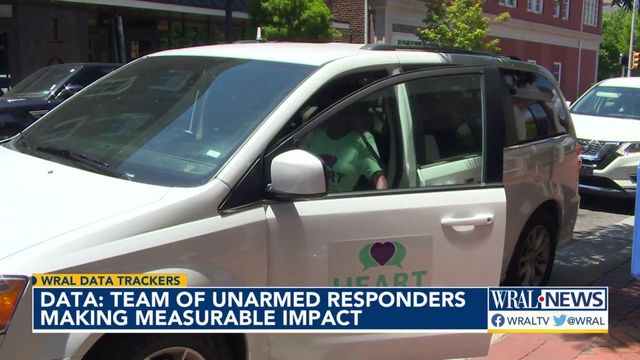Durham's unarmed first responders are making an impact, data shows
Since launching in late July, Durham's unarmed responders have gone to 199 calls.
Posted — UpdatedIn late June, Durham’s Community Safety Department launched new crisis pilot programs as part of its Holistic Empathetic Assistance Response Team (HEART):
- Crisis Call Diversion (CCD)
- Community Response Teams (CRT)
- Care Navigation (CN)
A fourth program, Co-Response (CoR), will launch in September.
In response to some 911 calls in Durham, a van from the HEART replaces the flashing lights and sirens.
Abena Bediako is a social worker who responds to the non-violent situations. She explained her team is usually called to instances of trespassing and welfare checks.
“We have really been welcomed even more than originally thought,” Bediako said.
Prior to the program’s launch, some community members were worried about the responders' safety.
The data shows they reported feeling safe 100% of the time. As of Tuesday, the HEART team has never needed police backup for safety.
“I’m really happy that our team has felt safe on every call,” said Community Safety Department Director Ryan Smith.
The data shows Community Response Teams typically took an average of 7.6 minutes to arrive on the scene in the first two months of the program. The team typically spends an average of 18.9 minutes on the scene.
“We are sending new types of responders to calls that we used to send police to as first responders, that they feel very safe in those interactions, and that we are diverting a majority of those calls and handling them on scene and giving them the care that they need,” Smith said.
Smith said he’s heard stories that have warmed his heart.
“They showed up to a downtown business and the person said 'I was really hoping it was going to be you who showed up,’” Smith said. “They were driving on the freeway and someone passed them and did the heart sign and said, ‘Thank you. Thank you.’”
The Crisis Call Diversion (CCD) unit embeds mental health clinicians in Durham's 911 call center. CCD has responded to 182 calls, the data shows. Sometimes, CCD provides assistance over the phone, and other times, in person with other agencies.
“We approach it as this is a human being who needs some assistance,” Bediako said. “Each of us could potentially be in that space.
“We all go through things. We just need a little empathy and a little grace.”
The CCD teams typically take an average of 0.2 minutes to connect and an average of 8.5 minutes on a call.
The Care Navigation unit, which launched this week, follows up with people within 48 hours of meeting with one of our first responders to help connect to the community-based care they need and want. The CN unit has had 35 responses, the data shows.
The Co-Response unit is set to launch in September. The unit will pair clinicians with police officers to respond to behavioral health calls for service that pose a greater potential safety risk. The city plans to provide more details on this pilot closer to its launch date.
Overall, the Community Safety Department has 20 positions that serve only a portion of the city in limited hours. The plan is for the department to grow to a larger, 24/7 operation.
Smith said he is a believer in the city’s new model, especially after two months into the program.
“To see the team that we’re building here, to hear them talk about the calls, yeah, I’m a believer,” Smith said.
Smith said his department has a strong collaboration with the Durham Police Department. He also said he’s gotten calls from cities like Austin, Texas; Seattle and Winston-Salem, wanting to learn more about Durham’s program.
• Credits
Copyright 2024 by Capitol Broadcasting Company. All rights reserved. This material may not be published, broadcast, rewritten or redistributed.






